Join Gyaldak Rinpoche and Pema Khandro Rinpoche to celebrate the Tibetan New Year ( the lunar new year), known as Losar.
Saturday, February 25th from 11am – 12:30pm
2328 Channing Way, Berkeley, CA 94704
We will practice the Milarepa meditation, prayer and feast practice (tsok).
This is a Tibetan meditation and prayer which involves visualizations, mantras and recitation of the Milarepa Tsok liturgy. Tsok means ‘gathering’ or feast – it is a central practice of Buddhist Tantra. Tsok is used to accumulate merit, set in motion positive momentum for one’s spiritual life, clear negative karma and strengthen one’s connections with the Buddhist teachings, teachers and community.
Participants should bring a dish of food or drink to share with everyone at a Tsok. You may also bring kombucha tea, red wine, flowers, money offerings or butterlamps. In a Tsok, all the food is shared during a break in the prayer. It is similar to a potluck in that everyone shares the food they bring in a great feast. However, unlike an ordinary potluck, in the Tsok, there are prayers and visualizations. Through the combination of praying, meditation, feasting and sharing, we connect with the buddha-nature of everyone in attendance.
What kind of food should I bring?
Traditionally one brings unopened food (which one has not eaten yet) and one brings wonderful, favorite foods to symbolize giving what is most precious as an act of generosity. *This is a vegetarian tsok, so all the food should be vegetarian.
This is an open program held on Saturday, February 25th from 11am – 12:30pm. All are welcome.
To register or for more information visit:
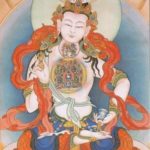

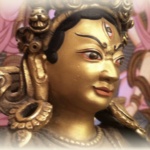
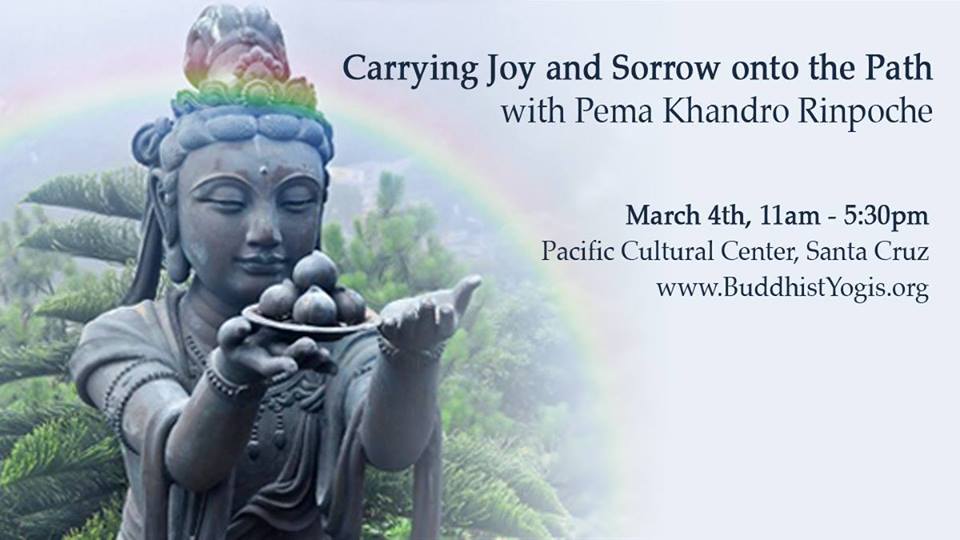
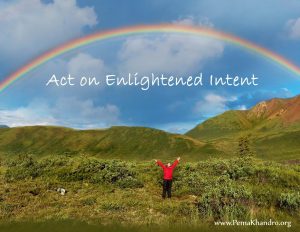
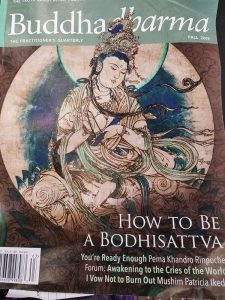 “What we see in the female buddha’s life story is that the path to buddhahood is not a perfect linear progression from a totally ignorant, karma-covered being to a fully awakened buddha. One’s identity oscillates along the way. What does not oscillate in Yeshe Tsogyal’s story, what remains constant throughout her training, maturity, and fully blossomed buddhahood, is that at all times she acts unwaveringly with the motivation to benefit others. This clarifies any questions about how an ordinary being can navigate the ambiguity of wisdom and confusion that characterizes our mental states. Our center of gravity and our guiding light is bodhichitta, our own altruistic motivation and enlightened intent. “May all beings everywhere be free from suffering”—this is not just a pie-in-the-sky wish that this will happen eventually. It is an explicit assumption of universal responsibility, a declaration that we ourselves will actively help make such benefits possible—beginning with taking responsibility for our own spiritual awakening. But who among us feels worthy of helping other beings right now? Of course Buddha could help people—he was enlightened. Of course Yeshe Tsogyal can help infinite beings—she’s gone beyond anger and grasping. But what about us? At what point in our development does the bodhisattva mandate kick in?” To read the full article click here –
“What we see in the female buddha’s life story is that the path to buddhahood is not a perfect linear progression from a totally ignorant, karma-covered being to a fully awakened buddha. One’s identity oscillates along the way. What does not oscillate in Yeshe Tsogyal’s story, what remains constant throughout her training, maturity, and fully blossomed buddhahood, is that at all times she acts unwaveringly with the motivation to benefit others. This clarifies any questions about how an ordinary being can navigate the ambiguity of wisdom and confusion that characterizes our mental states. Our center of gravity and our guiding light is bodhichitta, our own altruistic motivation and enlightened intent. “May all beings everywhere be free from suffering”—this is not just a pie-in-the-sky wish that this will happen eventually. It is an explicit assumption of universal responsibility, a declaration that we ourselves will actively help make such benefits possible—beginning with taking responsibility for our own spiritual awakening. But who among us feels worthy of helping other beings right now? Of course Buddha could help people—he was enlightened. Of course Yeshe Tsogyal can help infinite beings—she’s gone beyond anger and grasping. But what about us? At what point in our development does the bodhisattva mandate kick in?” To read the full article click here –